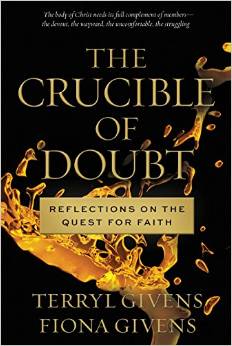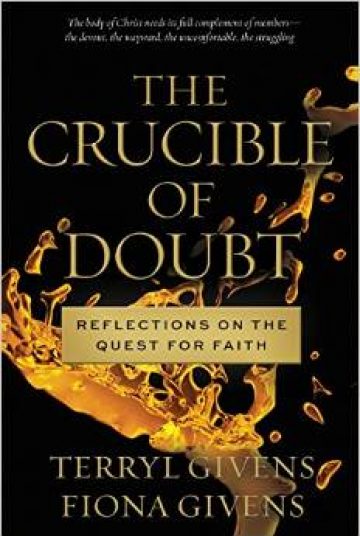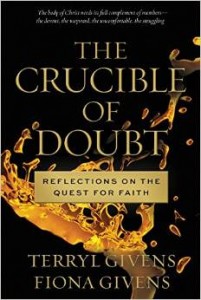I found “The Crucible of Doubt” to be rich with insight into age-old religious questions. Many of the chapters gave voice (and deeper meaning) to ideas I was already forming – regarding church, religion, and faith. I was also inspired with new ideas and found myself reframing worship and God in new, positive ways. I would recommend this book to any person of faith.
My two favorite chapters are Chapter 3, The Role and Function of the Church and Chapter 8, Find Your Watering Place.
In Chapter 3 (The Role and Function of the Church) brought to life many discussion I’ve had with others: “Faith is a way of life; a church is an institution designed to strengthen people in the expression of that life.” The Givens’ seem to say that true religion is a part of a person and an individual journey; the church is an aid to the human spirit and to this journey.
The scriptures often talk about the members of the church as “the body of Christ” and the Givens’ reflect this idea throughout their book and particularly in this chapter. “By coming together in community, serving and ministering to each other, sacrificing selflessly and loving unfailingly, we grow united, sanctified, and perfected in the family of Christ.”
They continue with how this family/ body of Christ worships together in churches on Sunday: “The main purpose of the Sabbath observance is to partake of the Lord’s Supper. … What if we saw lessons and talks as connections to the sacrament rather than as unrelated secondary activities? … [These Sunday activities] are the lay member’s equivalent of the widow’s mite: … a humble offering that is measured in terms of the capacity of the giver rather than in the value received.” Church suddenly has new meaning when we see the contributions of our sisters and brothers in this light. We worship better when we are not focused on simply being fed by the spirit; we give back. “Worship is about our offering – what we are prepared to relinquish? – what is our personal cost? … Come to the sacrament table and meet Christ’s gift with our own gifts.”
Chapter 8 (Find Your Watering Place) joins well with these ideas. If we seek spiritual food and spiritual strength (and it’s not always coming from church), then we must find our own well. (And, in my opinion, sometimes build our own well.) The church is a “good place, but ultimately, we are responsible for our own life of discipleship, for finding spiritual nourishment in our own sacred places.” This speaks to me of diligence, participation, and patience. It also makes me think of courage, because it is hard to take ownership for ones spirituality.
There are several other great ideas in the book – and I will review them below.
- Chapter 2: Of Life’s Fundamental Incompleteness
Here we learn that humans crave answers: “closure, certainty, wholeness, and equilibrium”, yet in earth life we rarely find these.
The Givens’ address the “would-be believer” and empathize with the loose ends and the perplexing questions. “Staying the course takes a great effort of will. … Leaving the faith may solve some problems but life is still complicated and hard … and there are other questions to be reconciled.”
- Chapters 5 and 6 fit nicely together
The Perils of Hero Worship & The Ring of Pharaoh
The Givens’ suggest that many people don’t want the personal responsibility of making choices (which is a hard thing), so they simply follow the ideas and suggestions of church leaders. Following counsel for wise women and men is not always a bad idea, but can be problematic when we don’t spend time on our own testimony of that counsel. And when things go wrong, it is easy for us blame leaders and feel betrayed by God.The Givens’ propose a better way to follow our leaders to recognize that God uses fallible humans to do his work (since he has no other kind) and feel encouraged by God’s trust in “us”. “Delegation is a sobering, even terrifying gesture on God’s part. … Surely no human an act with the wisdom, the perfect judgment, the infallibility of God. Precisely so.”
- Chapter 9: Rethinking Being “overcome with evil”
This chapter addresses the common question: “why do bad things happen to good people?” The Givens’ suggest that when see the weight and evil around us, we are tempted to fall into despair. “To live a life of discipleship feels heavy and lacking in joy.” And this makes “hope” the ultimate human victory – as we “anticipate actively on the basis of what we hope to be true ….” And we are consoled in our grief by the belief that God ultimately shares in our suffering, pain, and turmoil.
- Chapter 11: Belief as Risk – A Conclusion
“We cannot escape the burden of faith. The question is what we believe in, and why. … Of course, to believe is to risk error. To trust in a man, or a cause, or a God, is to risk disappointment. To act in faith is to risk failure, betrayal, even humiliation.” But when we allow ourselves to be vulnerable enough to believe, then our faith is lived, and that is its own reward.






5 Responses
[…] I found “The Crucible of Doubt” to be rich with insight into age-old religious questions. Many of the chapters …read more […]
Thanks for the this great review, Suzette. The chapter about finding your own well sounds particularly interesting to me. I will be ordering this book. Thanks again!
I am giving copies of this book as Christmas gifts to six people this year. It’s that good.
Thanks for this, Suzette. My book group is reading this this year and I’m looking forward to the discussion. It’s so true that it’s hard to take responsibility for one’s own spirituality, and easier to rely on authority. I hope this book brings that idea more into the collective consciousness of the church.
I suspect I may have some issues with chapter 9, I’ll see when I get to it.
Suzette, after our conversation on Saturday I went directly to the bookstore and bought a copy. I’m only several chapters in, but I’m resonating with what I’m reading. Thanks for inspiring me, especially regarding chapter 3.